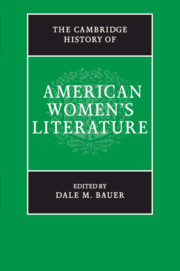Book contents
- Frontmatter
- Contents
- List of illustrations
- Acknowledgements
- Notes on contributors
- Introduction
- 1 The stories we tell: American Indian women's writing and the persistence of tradition
- 2 Women writers and war
- 3 American women's writing in the colonial period
- 4 Religion, sensibility, and sympathy
- 5 Women's writing of the Revolutionary era
- 6 Women writers and the early US novel
- 7 Women in literary culture during the long nineteenth century
- 8 Moral authority as literary property in mid-nineteenth-century print culture
- 9 The shape of Catharine Sedgwick's career
- 10 Writing, authorship, and genius: literary women and modes of literary production
- 11 Nineteenth-century American women's poetry: past and prospects
- 12 Transatlantic sympathies and nineteenth-century women's writing
- 13 Nineteenth-century African American women writers
- 14 Local knowledge and women's regional writing
- 15 Women and children first: female writers of American children's literature
- 16 US suffrage literature
- 17 American women playwrights
- 18 Turn-of-the-twentieth-century transitions: women on the edge of tomorrow
- 19 Accidents, agency, and American literary naturalism
- 20 The geography of ladyhood: racializing the novel of manners
- 21 Self-made women: novelists of the 1920s
- 22 Recovering the legacy of Zara Wright and the twentieth-century black woman writer
- 23 Jewish American women writers
- 24 Women on the breadlines
- 25 Modern domestic realism in America, 1950–1970
- 26 Lyric, gender, and subjectivity in modern and contemporary women's poetry
- 27 Contemporary American women's writing: women and violence
- 28 Asian American women's literature and the promise of committed art
- 29 Straight sex, queer text: American women novelists
- 30 Latina writers and the usable past
- 31 Where is she? Women/access/rhetoric
- 32 Reading women in America
- Index
- References
10 - Writing, authorship, and genius: literary women and modes of literary production
Published online by Cambridge University Press: 28 September 2012
- Frontmatter
- Contents
- List of illustrations
- Acknowledgements
- Notes on contributors
- Introduction
- 1 The stories we tell: American Indian women's writing and the persistence of tradition
- 2 Women writers and war
- 3 American women's writing in the colonial period
- 4 Religion, sensibility, and sympathy
- 5 Women's writing of the Revolutionary era
- 6 Women writers and the early US novel
- 7 Women in literary culture during the long nineteenth century
- 8 Moral authority as literary property in mid-nineteenth-century print culture
- 9 The shape of Catharine Sedgwick's career
- 10 Writing, authorship, and genius: literary women and modes of literary production
- 11 Nineteenth-century American women's poetry: past and prospects
- 12 Transatlantic sympathies and nineteenth-century women's writing
- 13 Nineteenth-century African American women writers
- 14 Local knowledge and women's regional writing
- 15 Women and children first: female writers of American children's literature
- 16 US suffrage literature
- 17 American women playwrights
- 18 Turn-of-the-twentieth-century transitions: women on the edge of tomorrow
- 19 Accidents, agency, and American literary naturalism
- 20 The geography of ladyhood: racializing the novel of manners
- 21 Self-made women: novelists of the 1920s
- 22 Recovering the legacy of Zara Wright and the twentieth-century black woman writer
- 23 Jewish American women writers
- 24 Women on the breadlines
- 25 Modern domestic realism in America, 1950–1970
- 26 Lyric, gender, and subjectivity in modern and contemporary women's poetry
- 27 Contemporary American women's writing: women and violence
- 28 Asian American women's literature and the promise of committed art
- 29 Straight sex, queer text: American women novelists
- 30 Latina writers and the usable past
- 31 Where is she? Women/access/rhetoric
- 32 Reading women in America
- Index
- References
Summary
In her 1988 introduction to Alternative Alcott, Elaine Showalter notes “a striking physical metaphor” between Louisa May Alcott's self-taught ambidexterity and her “conflicting literary impulses,” which Showalter summarizes as tending toward the “genteel, domestic, and moralizing,” on one hand, and toward “passion, anger, and satirical wit” on the other (left) hand (ix). Showalter's immediate focus is on the generic differences among Alcott's various literary productions and the way in which the sensation fiction, in particular, points to a powerful “alternative” to the domestic novels for which Alcott is best known. This focus has turned out to be a dominant one in Alcott studies over the past several decades, with numerous studies taking generic alternatives as their critical starting point. Yet Alcott's ambidexterity is also a striking metaphor for the various authorial modes that Alcott could assume. Showalter concludes that Alcott was, in fact, never fully satisfied with the work produced by either hand, because “she never entirely got over her awe for the masculine literary community of American Transcendentalist philosophy which her father represented, nor forgave herself for failing to measure up to his moral and intellectual standards.” Showalter associates this masculine literary community, in turn, with the “godly inspiration” of genius, and she sees the masks that recur in Alcott's fiction as representing “her own perennial effort to conceal the deeper meanings of her work,” including its genius, “from herself, as well as from others” (xlii–xliii).
- Type
- Chapter
- Information
- The Cambridge History of American Women's Literature , pp. 204 - 231Publisher: Cambridge University PressPrint publication year: 2012



